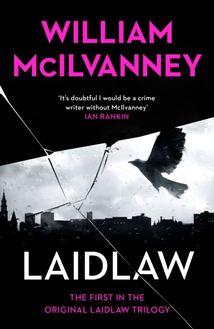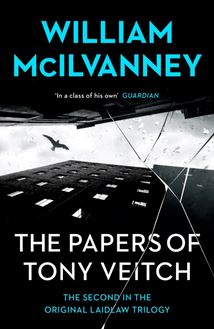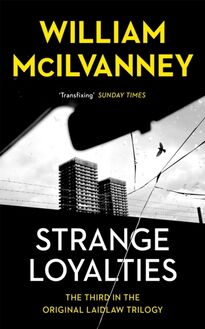Laidlaw , livre ebook
153
pages
English
Ebooks
2013
Vous pourrez modifier la taille du texte de cet ouvrage
Obtenez un accès à la bibliothèque pour le consulter en ligne En savoir plus
Découvre YouScribe en t'inscrivant gratuitement
Découvre YouScribe en t'inscrivant gratuitement
153
pages
English
Ebooks
2013
Vous pourrez modifier la taille du texte de cet ouvrage
Obtenez un accès à la bibliothèque pour le consulter en ligne En savoir plus
Publié par
Date de parution
02 mai 2013
Nombre de lectures
22
EAN13
9780857869975
Langue
English
Publié par
Date de parution
02 mai 2013
Nombre de lectures
22
EAN13
9780857869975
Langue
English
William McIlvanney is the author of the award-winningLaidlaw trilogy, featuring Glasgow’s original maverick detective.Both Laidlaw and The Papers of Tony Veitch gained Silver Daggersfrom the Crime Writers’ Association, while the third in theseries, Strange Loyalties , won the Glasgow Herald ’s People’s Prize.He died in December 2015. Laidlaw is the first in the original Laidlaw Trilogy.
Also by William McIlvanney The Laidlaw Trilogy The Papers of Tony Veitch Strange Loyalties Other Novels The Big Man Remedy Is None A Gift from Nessus Docherty The Kiln The Weekend With Ian Rankin The Dark Remains
The paperback edition published in Great Britain and Canada in 2021by Canongate Books Distributed in Canada by Publishers Group Canada First published in 2013 by Canongate Books Ltd, 14 High Street, Edinburgh EH1 1TE First published in Great Britain in 1977 by Hodder and Stoughton Ltd This digital edition first published in 2013 by Canongate Books canongate.co.uk Copyright © William McIlvanney, 1977 Extract from The Papers of Tony Veitch © William McIlvanney, 1983 Extract from The Dark Remains © William McIlvanney and John Rebus Ltd, 2021 The right of William McIlvanney to be identified as the author of this work has been asserted by him in accordance with the Copyright, Designs and Patents Act 1988 British Library Cataloguing-in-Publication Data A catalogue record for this book is available on request from the British Library ISBN 978 1 83885 619 9 eISBN 978 0 85786 997 5
Contents
1
2
3
4
5
6
7
8
9
10
11
12
13
14
15
16
17
18
19
20
21
22
23
24
25
26
27
28
29
30
31
32
33
34
35
36
37
38
39
40
41
42
43
44
45
46
47
48
49
The Papers of Tony Veitch
The Dark Remains
1
R unning was a strange thing. The sound was your feet slapping the pavement. The lights of passing cars batted your eyeballs. Your arms came up unevenly in front of you, reaching from nowhere, separate from you and from each other. It was like the hands of a lot of people drowning. And it was useless to notice these things. It was as if a car had crashed, the driver was dead, and this was the radio still playing to him.
A voice with a cap on said, ‘Where’s the fire, son?’
Running was a dangerous thing. It was a billboard advertising panic, a neon sign spelling guilt. Walking was safe. You could wear strolling like a mask. Stroll. Strollers are normal.
The strangest thing was no warning. You wore the same suit, you chose your tie carefully, there was a mistake about your change on the bus. Half-an-hour before it, you had laughed. Then your hands were an ambush. They betrayed you. It happened so quickly. Your hands, that lifted cups and held coins and waved, were suddenly a riot, a brief raging. The consequence was forever.
And the meaning of everything was changed. It had no meaning or too many meanings, all of them mysterious. Your body was a strange place. Hands were ugly. Inside, you were all hiding-places, dark corners. Out of what burrows in you had the creatures come that used you? They came from nowhere that you knew about.
But there was nowhere that you knew about, not even this place where you came and stood among people, as if you were a person. You could see who people thought was you in the mottled glass. His hair was black, his eyes were brown, his mouth wasn’t screaming. You hated his ugliness. There was a green bottle with what looked like a fern inside it. There was a nose with enormous nostrils. On the black surface there were cloudy streaks where the wipings of a cloth had dried. A man was talking.
‘See ma wife, son.’ He was speaking towards where you should be standing. ‘See when Ah go in here the night? Be like The Sands of Iwo Jima. Ah’ve been away since yesterday mornin’. Met an old mate yesterday after ma work. Christ, we had a night at his place. One half borrowed another, ye know? Ah wis helpin’ him to get over his wife. Died ten year ago.’ He was drinking. ‘Ah think Ah’ll go out an’ get knocked down. Give me an excuse.’
You used to think things like that could be a problem, too. You cried when you broke a vase your mother liked. You hid the pieces in a cupboard. You worried about being late, offending somebody, things you shouldn’t have said. That time wouldn’t come again.
Everything had changed. You could walk for as long as you liked in this city. It wouldn’t know you. You could call every part of it by name. But it wouldn’t answer. St George’s Cross was only cars, inventing destinations for the people in them. The cars controlled the people. Sauchiehall Street was a graveyard of illuminated tombstones. Buchanan Street was an escalator bearing strangers.
George Square. You should have known it. How many times had you waited for one of the buses that ran all through the night? The Square rejected you. Your past meant nothing. Even the black man on the black horse was from another country, a different time. Sir John Moore. ‘They buried him darkly at dead of night.’ Who told you his name? An English teacher who was always tired. Yawner Johnson. He told you interesting things between yawns. But he hadn’t told you the truth. Nobody had. This was the truth.
You were a monster. How had you managed to hide from yourself for so long? Some conjuring trick – to juggle smiles and nods and knives and forks and walks for the bus and turning the pages of a paper, for twenty years to make your life a blur behind which what was really you could hide. Until it came to introduce itself. I am you.
George Square was nothing to do with you. It belonged to the three boys walking tightrope on the back of a bench, to the people waiting in the bus-queues to go home. You could never go home again.
You could only walk and be rejected by the places where you walked, except the derelict tenements. They were big darknesses housing old griefs, terrible angers. They were prisons for the past. They welcomed ghosts.
The entry was dank. The darkness was soothing. You groped through smells. The soft hurryings must be rats. There was a stairway that would have been dangerous for someone who had anything to lose. At the top a door was broken. It could be pushed closed. Some light came in very dimly from the street. The room was very empty, some plaster from the ceiling on the floor.
It was strange how little blood there was, just some dark flecks on the trousers, so that you could imagine it had never happened. But it had happened. You were here. The body had been like leprosy. You were the leper, a contamination crouched and rocking on its haunches.
The loneliness was what you had made of yourself. The coldness was right. You would be alone from now on. It was what you deserved. Outside, the city hated you. Perhaps it had always excluded you. It had always been so sure of itself, so full of people who didn’t open doors tentatively, who had a cocky walk. It was a hard city. Now all its hardness was against you. It was a mob of bitter faces turned towards you, it was a crowd of angers all directed against you. You had no chance.
Nothing to do. Sit becoming what you are. Admit yourself, the just hatred of every other person. Nowhere in all the city could there be anyone to understand what you had done, to share it with you. No one, no one.
2
L aidlaw sat at his desk, feeling a bleakness that wasn’t unfamiliar to him. Intermittently, he found himself doing penance for being him. When the mood seeped into him, nothing mattered. He could think of no imaginable success, no way of life, no dream of wishes fulfilled that would satisfy.
Last night and this morning hadn’t helped. He had finally left Bob Lilley and the rest still on the surveillance in Dumfries. On the strength of solid information, they had followed the car from Glasgow. By a very devious route it had taken them to Dumfries. As far as he knew, that was where it was still parked – in the waste lot beside the pub. Nothing had happened. Instead of catching them in the act of breaking in, three hours of picking your nose. He had left them to it and come back to the office, gloom sweet gloom.
It was strange how this recurring feeling had always been a part of him. Even when he was a child, it had been present in its own childish form. He remembered nights when the terror of darkness had driven him through to his parents’ room. He must have run for miles on that bed. It wouldn’t have surprised him if his mother had had to get the sheets re-soled. Then it had been bats and bears, wolves running round the wallpaper. The spiders were the worst, big, hairy swines, with more legs than a chorus-line.
Now the monsters were simultaneously less exotic and less avoidable. He was drinking too much – not for pleasure, just sipping it systematically, like low proof hemlock. His marriage was a maze nobody had ever mapped, an infinity of habit and hurt and betrayal down which Ena and he wandered separately, meeting occasionally in the children. He was a policeman, a Detective Inspector, and more and more he wondered how that had happened. And he was nearly forty.
He looked at the clutter on his desk. It was as if on the desert island of his feeling this was all that chance had left him to work with: the two black-bound books of Scottish Criminal Law and Road Traffic Law , the red MacDonald’s, establishing precedents, and the blue book on stated cases, the telex-file on British crime, the folder of case-reports. He wondered how you were supposed to improvise fulfilment out of that lot.
He was aware of the neatness of Bob Lilley’s desk across from him. Did neatness mean contentment? He glanced over to the pin-board on the wall facing the door: shifts, departmental memoranda, a photograph of ‘The Undertaker’ – a con-man Laidlaw liked – overtime payments, a list of names for a Crime-Squad Dinner Dance. ‘These fragments I have shored against my ruin.’
Guilt was the heart of this kind of mood,


